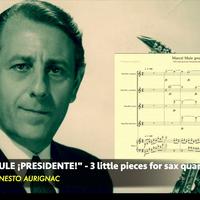マルセル ・ミュール
Marcel Mule.
Marcel Mule
Mule Marcel.
마르셀 뮬
Marcel Mule.
Марсель Мул.
Marcel Mule.
马塞尔·穆尔
馬塞爾·穆爾
マルセル ・ ミュールマルセル ・ ミュール は 、 フランス の クラシック ・ サクソフォーン 奏 者 、 音楽 教師 。
||||ふらんす||くらしっく||そう|もの|おんがく|きょうし
人物 ・ 生涯 ノルマンディー 地方 の オーブ に 生まれ 、「 LePatron = ルパトロン 」( 父 ) の 通称 で 知ら れた 。
じんぶつ|しょうがい||ちほう||||うまれ|lepatron||ちち||つうしょう||しら|
彼 は 偉大な クラシック ・ サクソフォーン 奏 者 と して 世界 的に 知ら れ 、 彼 の ため に 多く の 曲 が 作曲 さ れ 、 また 彼 に よって 初演 ・ 編曲 さ れた 。
かれ||いだいな|くらしっく||そう|もの|||せかい|てきに|しら||かれ||||おおく||きょく||さっきょく||||かれ|||しょえん|へんきょく||
He is world-renowned as a great classical saxophonist and many works have been composed for him and premiered and arranged by him.
これら の 曲 の 多く が 今日 の クラシック ・ サクソフォーン の レパートリー の 中心 を なして いる 。
これ ら||きょく||おおく||きょう||くらしっく|||れぱーとりー||ちゅうしん|||
Many of these pieces are central to today's classical saxophone repertoire.
父親 に 加えて フランソワ ・ コンベール から サクソフォーン を 学んだ 。
ちちおや||くわえて||||||まなんだ
In addition to his father, he learned the saxophone from François Combert.
また 、1935 年 に は ナディア ・ ブーランジェ に 師事 し 、 その 縁 で 多く の 作曲 家 と 知り合う こと と なった 。
|とし||||||しじ|||えん||おおく||さっきょく|いえ||しりあう|||
Also, in 1935, he studied under Nadia Boulanger, and through that connection he became acquainted with many composers.
休止 状態 に あった パリ 音楽 院 の サクソフォーン 科 を 1942 年 に 復活 さ せた 。
きゅうし|じょうたい|||ぱり|おんがく|いん|||か||とし||ふっかつ||
In 1942, he revived the dormant saxophone department of the Paris Conservatoire.
当時 すでに サクソフォーン 奏 者 および 教師 と して 評価 されて いた ミュール は 、 同 科 の 指導 者 に 選ば れた 。
とうじ|||そう|もの||きょうし|||ひょうか|さ れて||||どう|か||しどう|もの||えらば|
Mühl, who had already been evaluated as a saxophonist and teacher at that time, was chosen to lead the department.
パリ 音楽 院 の 教授 と して 、 ミュール は 300 人 以上 の 熱心な 学生 を 教え 、 その 多く が 自ら の 力 で 有名な サクソフォーン 奏 者 や 教師 と なって いった 。
ぱり|おんがく|いん||きょうじゅ|||||じん|いじょう||ねっしんな|がくせい||おしえ||おおく||おのずから||ちから||ゆうめいな||そう|もの||きょうし|||
As a professor at the Paris Conservatoire, Mule taught over 300 enthusiastic students, many of whom went on to become famous saxophonists and teachers in their own right.
また ミュール は 、 当時 第 一 級 の サクソフォーン ・ アンサンブル と いわ れた 「 パリ ・ サクソフォーン 四 重奏 団 」 を 結成 し 、 自ら も そこ で ソプラノ ・ サクソフォーン を 演奏 した 。
|||とうじ|だい|ひと|きゅう|||||||ぱり||よっ|じゅうそう|だん||けっせい||おのずから||||そぷらの|||えんそう|
Mule also formed the 'Paris Saxophone Quartet', which was said to be a first-class saxophone ensemble at the time, and played the soprano saxophone there.
ミュール は 1968 年 に パリ 音楽 院 の 教授 を 引退 した 。
||とし||ぱり|おんがく|いん||きょうじゅ||いんたい|
Mule retired as professor at the Paris Conservatoire in 1968.
彼 の 地位 は 、 かつて の 教え子 の ひと り であった ダニエル ・ デファイエ に 引き継が れた 。
かれ||ちい||||おしえご||||||||ひきつが|
His position was succeeded by one of his former students, Daniel Defayer.
引退 後 、 ミュール は 南 フランス の イェール に 隠 棲 ( いんせい ) し 、2001 年 12 月 19 日 、 睡眠 中 に 死去 した 。
いんたい|あと|||みなみ|ふらんす||||かく|せい|||とし|つき|ひ|すいみん|なか||しきょ|
After retiring, Mule retired to Yale in the south of France and died in his sleep on December 19, 2001.
100 歳 没 。
さい|ぼつ
Died at the age of 100.
ミュール が パリ 音楽 院 で 教鞭 ( きょうべん ) を 執った 時期 は 、 現在 で は クラシック ・ サクソフォーン の 開花 期 であった と も 見なされて おり 、 そのような 意味 で ミュール は サクソフォーン の 歴史 に 大きな 影響 を 与えた 人物 である 。
||ぱり|おんがく|いん||きょうべん|||とった|じき||げんざい|||くらしっく|||かいか|き||||みなさ れて|||いみ||||||れきし||おおきな|えいきょう||あたえた|じんぶつ|
The period in which Mule taught at the Paris Conservatoire is now considered to be the flowering period of the classical saxophone, and in that sense Mule had a great influence on the history of the saxophone. is the person who gave
それでは 、 ミュール 氏 の 演奏 する バッハ 作曲 の フルート ・ ソナタ を 聞いて みましょう 。
||うじ||えんそう||ばっは|さっきょく||ふるーと|そなた||きいて|み ましょう
Now, let's listen to Bach's flute sonata performed by Mr. Mühl.
Écoutons l'interprétation par M. Mühl d'une sonate pour flûte de Bach.

